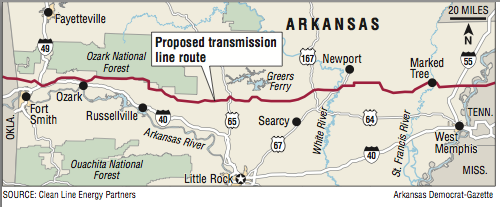WASHINGTON -- The U.S. Department of Energy and Clean Line Energy Partners severed ties Friday, ending their joint effort to build a power line across Arkansas.
Members of the state's congressional delegation, who had fought the $2.5 billion project for years, welcomed the news.
"This is a victory for states' rights and a victory for Arkansas. We are pleased that the Department of Energy responded favorably to our request to terminate this agreement. We support policies that put our nation on the path to energy independence, but they should not cost Arkansas landowners a voice in the approval process," the state's delegation said in a joint statement.
The statement was issued by U.S. Sens. John Boozman and Tom Cotton, and by U.S. Reps. Rick Crawford, French Hill, Steve Womack and Bruce Westerman, all Republicans.
The Houston-based company had worked for years to build a 705-mile power line that would link wind farms in the Oklahoma panhandle to customers in Tennessee.
After encountering opposition in Arkansas, company officials asked then-President Barack Obama's administration to intervene.
In March 2016, then-U.S. Energy Secretary Ernest Moniz invoked Section 1222 of the Energy Policy Act of 2005, which gives the Energy Department the "authority to design, develop, construct, operate, own, or participate with other entities in designing, developing, constructing, operating, maintaining, or owning ... electric power transmission facilities."
Moniz said the project was "necessary to accommodate an actual or projected increase in demand for electric transmission capacity."
The Plains & Eastern Clean Line project would have entered Arkansas near Van Buren and exited the state near Wilson in Mississippi County.
It would have carried 4,000 megawatts, enough power to supply 1 million homes.
Opponents feared the federal government would use its power of eminent domain to build the line, forcing landowners to sell their property against their will.
But the project stalled; any momentum that might have existed disappeared once President Donald Trump took office.
In December, Clean Line Energy Partners sold the Oklahoma portion of the project to NextEra Energy Resources.
In January, Arkansas' D.C. delegation members asked U.S. Energy Secretary Rick Perry to cancel the project or put it on hold, arguing that the sale and other developments make it unlikely that the work would proceed.
On Friday, a spokesman for the Energy Department said the parties had "mutually agreed to terminate their Participation Agreement," adding, "DOE remains committed to an 'all of the above' energy strategy, improving our Nation's electricity infrastructure, and increasing the reliability and resiliency of the electrical grid."
In an email, Clean Line spokesman Sarah Bray said the March 2016 participation agreement had been canceled "due to the changes in ownership structure."
"The project is not dead, but it is on a much slower track. Clean Line maintains ownership of the project assets in Arkansas and Tennessee and is evaluating next steps," she added.
Steve Stengel, a spokesman for NextEra Energy Resources, said his company already owns and operates wind farms in Oklahoma and viewed the purchase as "a long-term development opportunity."
Friday's announcement "does not impact our Oklahoma plans," he added.
Arkansas Gov. Asa Hutchinson welcomed Friday's announcement and praised members of the U.S. House and Senate for their role in the struggle.
"Arkansas' federal delegation has been doggedly persistent in protecting the voice of Arkansas landowners and the state's role in approving interstate transmission lines," he said. "I appreciate the work of the delegation, and I am very happy for all the landowners who have expressed their concern on this project."
Arkansas isn't the only place where Clean Line encountered opposition. A similar power line has sparked ongoing legal skirmishes in Missouri.
Crawford County resident Julie Morton, who battled the project for years, called Friday's announcement "a real nice surprise."
"The opposition was, I think, far more vehement than Clean Line ever anticipated," she said.
The project would've scarred the landscape, she said.
"They were going to cross seven scenic byways, two federally designated wild and scenic rivers, Crowley's Ridge, the Mississippi Flyway," she said. "To devastate 8,000 acres of my state, for a line that was unnecessary, was untenable."
Thousands of Arkansans viewed the project as a threat and joined forces to block it, she said.
"We just garnered our forces, held a whole bunch of meetings, got our federal delegation involved, got our state legislators involved, and we the people won," she added.
Information for this article was contributed by Dave Hughes of the Arkansas Democrat-Gazette.
A Section on 03/24/2018

